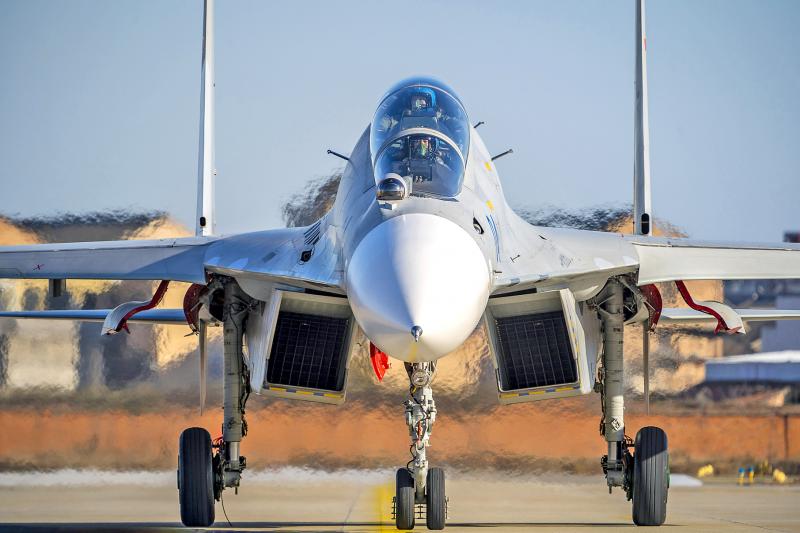China on Sunday sent 39 warplanes — mostly fighter jets — into Taiwan’s air defense identification zone (ADIZ), in its second-largest single-day incursion, the Ministry of National Defense said.
Thirteen warplanes entered the zone yesterday, it added.
The ministry late on Sunday said that the air force scrambled aircraft to broadcast warnings and deployed air-defense missile systems.

Photo: AP
The Chinese warplanes included 24 J-16 fighters — which experts say are among China’s favorite jets for testing Taiwan’s air defenses — 10 J-10s and one nuclear-capable H-6 bomber.
Yesterday’s incursion included eight J-16s and two J-16Ds — a jet introduced at an air show last year that is capable of neutralizing radar and communication systems, the ministry said.
On Oct. 4 last year, 56 aircraft entered the zone, the largest single-day incursion since the military began releasing such data in September 2020.
Last year, the ministry recorded 969 incursions by Chinese warplanes into Taiwan’s ADIZ, a database compiled by Agence France-Presse showed — more than double the number from 2020.
Yesterday, defense expert Lin Ying-yu (林穎佑) said that Beijing was trying to show its military might to world powers Japan and the US, which over the weekend concluded a round of drills off Okinawa.
Chieh Chung (揭仲), an associate research fellow at the National Policy Foundation in Taipei, agreed, saying that the incursions did not pose a serious threat to Taiwan’s security, but were intended to show Tokyo and Washington that Beijing would not back down from a show of force.
The incursions were also far away from Okinawa to ensure that China gets its message across without sparking a conflict, he said.
The Japan Maritime Self-Defense Force conducted joint exercises with the US Navy south of Okinawa from Monday last week to Saturday, NHK reported.
The latest joint exercise was apparently aimed at displaying their solid ties amid China’s increasing maritime activities, reports said.
Minister of Foreign Affairs Joseph Wu (吳釗燮) said in an interview with the Australian Strategic Policy Institute’s podcast The Bigger Picture that the international community should be vigilant of China as it seeks to expand its global influence.
Amid China’s nearly 1,000 incursions last year, Beijing continued to suppress Taiwan’s international presence, a ministry statement quoted Wu as saying.
China’s ambition apparently does not stop at Taiwan, Wu added, citing as an example the presence of Chinese surveillance ships near US-Australian military exercises in July last year.

SECURITY: As China is ‘reshaping’ Hong Kong’s population, Taiwan must raise the eligibility threshold for applications from Hong Kongers, Chiu Chui-cheng said When Hong Kong and Macau citizens apply for residency in Taiwan, it would be under a new category that includes a “national security observation period,” Mainland Affairs Council (MAC) Minister Chiu Chui-cheng (邱垂正) said yesterday. President William Lai (賴清德) on March 13 announced 17 strategies to counter China’s aggression toward Taiwan, including incorporating national security considerations into the review process for residency applications from Hong Kong and Macau citizens. The situation in Hong Kong is constantly changing, Chiu said to media yesterday on the sidelines of the Taipei Technology Run hosted by the Taipei Neihu Technology Park Development Association. With

A US Marine Corps regiment equipped with Naval Strike Missiles (NSM) is set to participate in the upcoming Balikatan 25 exercise in the Luzon Strait, marking the system’s first-ever deployment in the Philippines. US and Philippine officials have separately confirmed that the Navy Marine Expeditionary Ship Interdiction System (NMESIS) — the mobile launch platform for the Naval Strike Missile — would take part in the joint exercise. The missiles are being deployed to “a strategic first island chain chokepoint” in the waters between Taiwan proper and the Philippines, US-based Naval News reported. “The Luzon Strait and Bashi Channel represent a critical access

CARROT AND STICK: While unrelenting in its military threats, China attracted nearly 40,000 Taiwanese to over 400 business events last year Nearly 40,000 Taiwanese last year joined industry events in China, such as conferences and trade fairs, supported by the Chinese government, a study showed yesterday, as Beijing ramps up a charm offensive toward Taipei alongside military pressure. China has long taken a carrot-and-stick approach to Taiwan, threatening it with the prospect of military action while reaching out to those it believes are amenable to Beijing’s point of view. Taiwanese security officials are wary of what they see as Beijing’s influence campaigns to sway public opinion after Taipei and Beijing gradually resumed travel links halted by the COVID-19 pandemic, but the scale of

Pope Francis is be laid to rest on Saturday after lying in state for three days in St Peter’s Basilica, where the faithful are expected to flock to pay their respects to history’s first Latin American pontiff. The cardinals met yesterday in the Vatican’s synod hall to chart the next steps before a conclave begins to choose Francis’ successor, as condolences poured in from around the world. According to current norms, the conclave must begin between May 5 and 10. The cardinals set the funeral for Saturday at 10am in St Peter’s Square, to be celebrated by the dean of the College